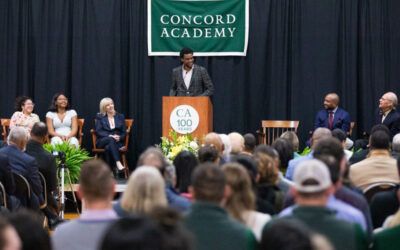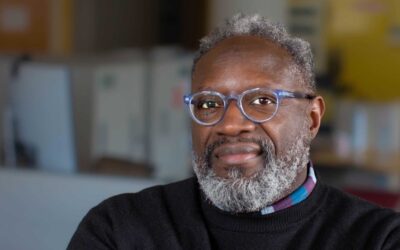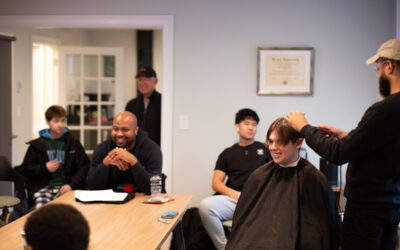“Here and Heaven” (Written by Chris Thile, performed by Yo-Yo Ma, Stuart Duncan, Edgar Meyer, Chris Thile, and Aoife O’Donovan)
Good morning, everyone, welcome back, and Happy New Year! It’s great to be back here with all of you. And given how cold it is this morning, I’m grateful for all the body heat here in the chapel. Welcome to winter.
Before I begin I want to mention those students who will be studying away from CA this semester: Abraham Beningson, Linc Berkley, Isabel Cushing, Elianna Knight, Grace Lin, Lilian McCarthy, Jesse Ryan, and Jackson Sypher. Also away this semester are Brandor Matos and Charlotte Mines, who continue at their School Year Abroad programs. And I want to offer a special welcome back to those students who are returning from a semester away: Miranda Brown, Gwen Sadie, Louise Sandback, Joey Sarno, John Torchiana, and Stanley Zheng. We’re glad that you’re back with us.
I hope everyone had a good and restful winter break. While you were away, the CA Labs construction project saw great progress, with the new addition’s steel frame well underway and the old building now ready for renovation. On the West Gate tennis courts, the temporary modular classrooms are also ready. As I told one student, these classrooms, while lacking some of the personality of the old classrooms, will nevertheless be sufficient to support teaching and learning. And though we know these changes — both holding classes on the west end of campus and navigating around the CA Labs construction site — mean new traffic patterns and a few inconveniences, we think the end result will be worth these sacrifices.
Besides giving me time to catch up on reading and sleep, winter break found me waiting in a few long grocery lines; it’s not so bad if you can find a way to amuse yourself. In my case, waiting in a grocery line affords me one of my favorite guilty pleasures — reading People magazine headlines. Like this one — “Pope Francis: Inside his Private World — He loves soccer and selfies, dances the tango and eats more pasta than he should. An up close look at the rebel who’s changing the world.” (Note to Pope Francis: Thank you for showing the world how not to take yourself too seriously.) Or this one — “Iron Couple Shocker — It’s Over! Pepper’s Heartbreak as Tony tells her ‘Iron Man Comes First.’” (Note to the People magazine staff: Tony and Pepper are fictional characters.) Or finally this one — “My Own Story: Khloe Kardashian Breaks Her Silence.” (Note to Khloe Kardashian: I may be mistaken here, but I think in order to “break” a silence, you have to be silent for some period of time.)
Now, it’s risky to consume too much of this stuff; if “feeding your brain” well means filling it with great literature, science, art, and culture, People magazine is mental junk food. A steady diet of it will stunt your intellectual growth, but it’s okay to enjoy an occasional snack. That’s the consensus in my family, at any rate. We arrived at that conclusion one day when we were eating dinner, during one of those brief intervals when we weren’t talking about food, that is. Planning the next meal while we’re eating the one in front of us is part of my family’s pattern. It’s maddening to many people outside our family and even to some within it — my brother-in-law, for instance, cannot abide this practice. When the talk turns to the next meal, he rolls his eyes, lets out a sigh, and trains his attention on his plate, forking food into his mouth, gazing expressionlessly out the window, and chewing with the steady calmness of a cow. He’s a serious eater, my brother-in-law. He does not like to interrupt his food intake with conversation of any sort, but especially conversation about what’s for lunch or dinner or even a mid-afternoon snack. Fortunately, my brother-in-law is outnumbered by the rest of us, who embrace talk about food — both what we’re eating and what we might eat — as a complementary pleasure, a trigger for memories and stories about meals and gatherings past, an opportunity to share recipes or variations on dishes we’re savoring. In a way, these conversations serve even as prelude to a performance, and they sustain us, too, every bit as much as food does.
But, as is always the case for me over winter break, I also had to write a chapel. As I began pondering that idea, I remembered a moment from an episode of Our Gang, a television show about the adventures of a group of poor neighborhood kids. The gang, also known as the “little rascals,” was competing in a soapbox derby race when, as their soapbox car careened downhill, they lost the ability to brake or steer. With great alarm, one asked, “Where we going?” to which another happily replied, “I don’t know, but we’re on our way!” The same could be said for chapel talks. Here goes….
Part I
In my early 20s, I drove some really bad cars, but the worst might have been a Ford Maverick, which ran adequately but looked awful, with torn vinyl seats and a body that was pock-marked with rust and dents. By necessity, I learned basic car maintenance from a book, since I couldn’t afford to pay a mechanic. I managed, for the most part. The car got me to and from the places where I was working — a substitute teacher at various schools around the NH seacoast; a furniture mover; a sometime writer for the NH Council for the Humanities; and a laborer/handyman for a homesteader in Vermont (not far from the Mountain School, as a matter of fact). But as winter came on, the car struggled in the cold and snow. I found myself cursing the car on a daily basis. A friend was riding with me one day when the car was running especially rough, and I was pounding the steering wheel and crafting a monologue of Shakespearean vulgarity when my friend quietly said, “You should try talking nicely to your car.” She told me about her sister, who drove a thirty year-old Volkswagen Beetle; she had no mechanical ability whatsoever, but she hung flowers and incense from the dashboard and sang sweet songs while she drove. The car never broke down. “Maybe you should try that.”
I thought, ‘Gosh. That’s a swell idea. I can’t imagine why I didn’t think of it myself.’ I thought of saying that, but she was so nice and so sincere, all I said was, “Maybe I will.”
I finally brought the car to a repair shop and got a diagnosis: the distributor was going. The estimated cost for replacing it at the shop was in the hundreds of dollars; even though I’d done only basic tune-ups to this point, I decided that I was going to fix this myself. I went to the auto parts store and bought a distributor rebuild kit. On a frigid January morning I opened the Maverick’s hood, removed the faulty distributor, and took it apart on my kitchen table. I replaced several worn pieces and then reassembled the mechanism. I strode back out into the cold, brimming with confidence and pride. Rebuilt a distributor — yes, I did. Like having a new car. Fraction of the cost. What a talented guy. These thoughts ran like a loop through my brain.
It was afternoon by now, and the wind across the lake was bitterly cold. I opened the hood and only then discovered that I had forgotten a critical step in the process: I had not marked the position of the distributor, specifically, the position of the rotor. Without getting too technical, unless the position of the new rotor matched the exact position of the old rotor, the car would not start. Suddenly that loop playing in my head changed. I was an idiot. What was I thinking? I could barely replace my typewriter ribbon, let alone repair a car ignition.
With frozen fingers, I worked to slide the part into its proper position, moving it by millimeters each time but failing again and again to hit the spot. I had to go back indoors every few minutes to regain movement in my hands, and with each failed attempt, my spirit dropped. The sun had gone down by now and the temperature was near zero. I was too tired and downcast even to curse properly, but I pointed a flashlight into the engine and tried once more to install the distributor — this time, it dropped into position with a click. I was dumbfounded. For a moment, I didn’t move, and then I quickly tightened the mechanism into place, re-attached the cap and sparkplug wires, and slid behind the wheel. I held my breath and turned the key — the engine turned over, then roared to life.
Let me say that I believe in careful preparation, hard work, and persistence through obstacles, but in this case, the only explanation I could come up with was — I got lucky. That may not seem profound, but sometimes it’s true.
Advice part I: You should always try to leave as little to chance as possible. Prepare, work hard, persevere — and if you do get lucky, don’t pretend you planned it that way. Just be thankful.
Part II
This past summer, in the midst of recovering from another running injury, I decided to take the advice of a friend of mine and try bicycling. I had some experience, albeit more than thirty years ago, with riding a road bike, but I quickly discovered that a lot had changed. The bikes themselves weighed a fraction of those earlier models, and the attire was, well, not made for a body as middle-aged as mine. Still, I bought a moderately-priced road bike, overcame my misgivings about the skintight clothing, and started riding. I had become a MAMIL — a Middle-Aged Man In Lycra. (Thank you, Sonia Lo, for sharing that acronym with me.) Riding was really fun, if occasionally scary, mainly because of the behavior of humans driving cars. It’s amazing how your perspective changes on the road when you’re on a bike rather than in a car — but I digress. After a couple of weeks, I decided to replace my sneakers and flat pedals with bike shoes and clips — which meant my feet were locked to the pedals unless I rotated my heel outward to release my shoe. I practiced locking and unlocking until I felt comfortable enough to go out on the road. That first ride was going well enough until I turned up Annursac Hill; this is a very steep hill and I felt myself slowing down as I rapidly tried to downshift. Not rapidly enough. As I began to fall I tried to kick out my right heel to unlock my foot, to no avail. I ended up on my back, my feet still locked into both pedals. Very smooth. Exceedingly athletic even.
A few days later, while taking a photo of the sun rising over Hutchins Farm on Monument Street, one foot still locked into its pedal, I reached down for my water bottle, leaning just a touch too far. Over I went. Commuters driving by were treated to the amusing sight of me struggling to untangle myself on the side of the road. No one stopped to see if I was okay — I was a little surprised at that — but I figured the passersby wanted to allow me to really savor this humiliation. I extricated my foot from the pedal, brushed myself off, and got back on the bike.
But here’s the thing: Whatever you do, sometimes you’re going to fall. It may hurt, it will probably be a little embarrassing, but it happens to everyone.
Advice Part II: Get back on.
Advice Part III: For you seniors, this semester, most likely anyway, will be your last one as a student at CA. I hope you can savor these months, these weeks, these days, these moments with the people here around you. You will be thankful if you do. You may not be able to stop time, but you can slow it down a little if you try.
Oh, and one last thing: If People magazine comes calling, consider your dignity, but don’t take yourself too seriously. It’s working for the Pope.
Thank you for listening – and Happy New Year to you.
RGH
“Steal Your Heart Away” (Written by Lindsey Buckingham, performed by the Watkins Family Hour)


